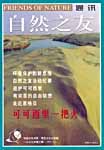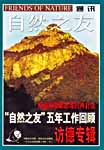Six years after Liang Congjie founded Friends of Nature
- China's first non-governmental environmental organization
- the grandson of renowned Qing dynasty (1644-1911)
reformer Liang Qichao continues to fight for nature
the "Chinese way."
It's easy to miss Liang Congjie
in a crowd. There's nothing immediately striking about
the soft-spoken 67-year-old history professor with
wire-framed glasses and silver-streaked hair. But
Liang's activism speaks for itself. He is a leader
in the fight to preserve China's highly endangered
environment. While his counterparts in the West were
chaining themselves to trees and challenging whaling
boats in rubber dinghies, Liang - a Beijing native
whose name translates into "heed warning" - began
promoting environmental protection by educating China's
public and working with the state-run media.
"Radical activism is not practical
in China," Liang says. "The police will say you are
disturbing public order. They have hundreds of reasons
to stop you, even to arrest you. We have to find another
way of doing it, a more Chinese way."
A Voice of Reason
Of course there were already other environmental organizations
in China, such as the China Environmental Protection
Foundation, created by the State Environmental Protection
Agency. But these groups bear the stigma of direct
government ties.
"It is problematic for official
organizations in China to criticize the government,"
Liang says in flawless English, acquired from his
U.S.-educated parents. "In traditional Chinese culture
'children' should never criticize their 'parents.'
They're only allowed to help by doing some housework."
Deciding that there was more than
one way to save the Earth, Liang chose to become a
critical voice of reason with an emphasis on education,
dialogue and cooperation. With that end in mind, he
founded Friends of Nature (FON), China's first non-governmental
environmental group.
Liang's Lineage
Progressive thought has been a trademark of Liang's
family for the past three generations. In the late
19th century Liang's grandfather, Liang Qichao, was
a Western-influenced reformer serving in the Qing
dynasty court. He was a leader of the ill-fated 1898
Reform Movement aimed at introducing Western political
reforms attempt to save the corrupt and ailing imperial
system.
Liang's father, Liang Sicheng,
was a renowned architect and served as a Beijing city
planner after the Communist victory in 1949. The elder
Liang envisioned the capital of the New China as a
city within a city: Beijing's historic, walled inner
city would be preserved, with new construction taking
place outside and around the city walls, on top of
which a promenade park would be built. Soviet advisers
dismissed the plan as foolish, stating that Liang
knew nothing about building a modern capital. He fell
out of favor with Mao Zedong and died in disgrace
during the Cultural Revolution (1966-76). Only after
his death was he given credit for his eco-friendly
design.
But Liang's gradual approach to
change is just one way in which he is distinguishing
himself from the failed efforts of his forebears.

Worked to the Bone
Liang is the consummate workaholic. He puts in an
average of 65 hours per week, much of it spent in
his office - which features souvenirs from his projects
across China and a banner autographed by U.S. president
Bill Clinton. As founder and president of Friends
of Nature, his work sometimes requires him to travel
to host forums and to conduct research on environmental
protection and sustainable development in China.
"Liang is a charismatic role model,"
says Zhang Jilian, manager of FON headquarters in
Beijing, who proudly points out that all staff business
cards are printed on recycled paper. "He personifies
and epitomizes the spirit of Friends of Nature. It
wouldn't be what it is today without his efforts."
The newest demand on Liang's time
is a joint venture between his group and Project Hope,
an official organization committed to improving rural
education. By working together, the two groups aim
to bring basic environmental education to rural youth.
The Beginning
Liang and a group of friends began exploring avenues
for public involvement in environmental protection
in 1993. They decided that creating a non-governmental
organization (NGO) would be the most effective way
to reach the largest number of fellow Chinese. They
applied for official government sanction and, after
a long, difficult year of meetings, were finally approved
and registered as the Academy for Green Culture, an
affiliate of the Academy for Chinese Culture.
"In China the registration process
often takes a long time, and that forces an organization
to carefully evaluate what they want to do and how
they want to do it," says Wang Qiuming, director of
China's Agenda 21, an organization that was created
to carry out the resolutions of the 1992 Earth Summit
in Rio de Janeiro. "Most groups don't want to go through
that effort," Wang adds.
After its founding, one of the
group's first projects was organizing Earth Day (April
22) events annually across China. Two years later,
the group won the first-ever Asian Environmental Award,
issued jointly by Japan's Mainichi Daily and the Korean
Daily.
Today, there are over 700 individual
and 24 corporate FON members. The non-profit, public
welfare organization is funded entirely by membership
fees and public support, Liang says.
While there are now plenty of groups
like it in China, FON is still the largest and one
of the most experienced at raising public awareness
of environmental problems through education, subjecting
offenders to official censure and developing strong
relationships with overseas environmental groups.
Reciprocal Relationship
One might conclude that Liang, in his self-appointed
role as environmental watchdog in the PRC, must walk
a fine line between official and independent spheres.
But it is his experience that the central government
sees FON as a necessary ally in the battle to raise
environmental awareness and implement necessary reforms.
As a result, the relationship is characterized by
mutual cooperation.
A prime example of this cooperation
occurred in 1995 when FON took action to prevent the
destruction of the habitat of the endangered golden
monkey by loggers in Yunnan province.
Liang saw the effort as more than
just preventing deforestation and preserving an endangered
species. He saw the destabilization of a delicate
ecosystem. The monkeys depend on a special fungus
as their main food source. Without the monkeys, the
fungus will overgrow and hinder the development of
plant life.
Soon after the group wrote to the
central government pleading for protection of the
forest and monkeys, the provincial government was
ordered to stop the logging. An all-out cessation
of logging, however, threatened to destroy the local
economy, which was almost entirely dependent on the
timber industry. As a result, the county struck a
compensation deal with the central government for
RMB11 million (US$1.4 million) per year.
However, local authorities turned
a blind eye and logging continued. To expose the violation,
FON convinced China Central Television (CCTV) to document
the situation. In 1998, Premier Zhu Rongji, who reportedly
saw the piece, ordered a series of measures - including
removing several local leaders from power - which
effectively ended the threat to the golden monkeys
and their habitat.
Dilemmas and Risks
Despite his mission to protect the environment, Liang
is sensitive to the debate over human needs versus
environmental demands.
"It's really a dilemma," Liang
says. "But to me it's a matter of time. If you destroy
your resources now, your children will suffer. You
will not be so poor but your children will be even
poorer. But I know it's difficult, so I always make
sure I avoid empty 'green' words - slogans that have
no practical value. We have to work very hard to solve
problems pragmatically."
Although Liang is a self-declared
moderate, the very nature of his cause has earned
him a multitude of enemies.
For instance, after the government
declared a comprehensive logging ban following 1998's
devastating floods, FON learned of a massive logging
operation in Sichuan province. Once again a local
FON team and a CCTV crew were mobilized to document
the development. The crew surreptitiously entered
the logging site with hidden cameras and exposed the
operation, but locals with a vested interest in the
logging remained intent on resistance. Member of Liang's
documentary crew reported receiving anonymous death
threats.
Environmental protection efforts
in China have also been accused of interfering with
the nation's economic development. Convincing peasants
in their township and village enterprises to give
up new and prospering, but polluting, industries isn't
easy. But Liang believes that through open dialogue
rather than preaching, FON can change people's habits.
"We are advocates of controlled
consumption, not suspension of development," he says,
adding: "Pursuing the culture of waste is a dead end
for China. If everyone tries to have a life like that,
our future is bleak."

Next Generation
Despite his work, Liang refuses to call what he does
activism. He explains that a small group like his
cannot possibly take on every single environmental
issue in China. Rather, FON seeks to raise awareness
through education: classroom teaching, college lectures
and community events. Their primary target is the
younger generation - tomorrow's leaders and activists,
as well as tomorrow's consumers and polluters.
Liang's work leaves him little
time for his wife, or his 26-year-old daughter who
is studying environmental ethics at the University
of Wisconsin. But for Liang, as a Chinese father,
it is the least he can do. "We have to ask ourselves,
what kind of legacy will we hand on to our children?"
Liang reflects. "What are we without the natural world
around us?"
Anyone interested in helping Friends
of Nature may apply to become a member or volunteer.
Foreigners are admitted as "associate members."
Friends of Nature (http://www.fon.org.cn)
can be contacted at PO Box 621, Beijing, China 100010.
Tel: 6405-6621. Email: office@fon.org.cn
Race to Save the Tibetan Antelope
Rising demand among the fashion-conscious elite in
the West for shahtoosh, a fine cashmere-like material
made from Tibetan antelope fur, is placing the creature
among the ranks of the giant panda, the Yangtze River
dolphin, and the Manchurian tiger as a highly endangered
species in China.
Also known as the chiru, the Tibetan
antelope lives in a remote area stretching across
western provinces Xinjiang and Qinghai, as well as
Tibet. On average, it takes the pelt of three chirus
to make one shahtoosh shawl, which can sell for as
much as US$1,000.
Beijing-based Friends of Nature,
China's first non-governmental environment group,
has taken a leading role in the fight to save the
gazelle-like animal. The group has lobbied governments
around the world calling for an international ban
on the sale of shahtoosh products, and has worked
hard to bring the issue to the attention of the Chinese
government.
The most recent survey, taken in
1995, placed the Tibetan antelope population at 75,000.
Considering the rate of chirus killed is estimated
at 20,000 per year, the entire species could be wiped
out within 20 years, according to Friends of Nature.
Shahtoosh, which comes from the
Persian word for "king of wool," is manufactured in
Kashmir, a state in northern India. It is one of the
few places in the world where manufacturing the material
has not been outlawed. The raw materials for processing
shahtoosh are available only from the Himalayan plateau
region of China, and local poachers are all too happy
to supply manufacturers for the otherwise unimaginable
amounts of RMB70,000, or US$8,500 per kilogram.
Many in the business of producing
shahtoosh shawls maintain that the soft, warm down
is carefully collected from the ground after the animal
sheds it. But those who have seen the thousands of
skinless chiru carcasses littering the plateau know
better.
The vast and remote character of
the chiru's habitat makes protection difficult. It
can take weeks for the Qinghai-based anti-poaching
team, a group of Khampas (traditional Tibetan warriors)
known as the Wild Yak Brigade, to sweep the region
just once. To help the team cover more ground, Friends
of Nature donated two jeeps.
But the brigade's problems go beyond
logistics. Two of its leaders have been killed on
duty: one in a gun fight with poachers, and the other
in his own home. Authorities proclaimed the latter
a suicide, saying the victim shot himself following
a fight with his wife. Yet those who knew the man,
described as a strong-willed individual dedicated
to the cause, remain skeptical.
Other groups helping to save the
chiru include the Wildlife Protection Society of India,
the London-based Environmental Investigation Agency,
and the U.S.-based International Fund for Animal Welfare.




